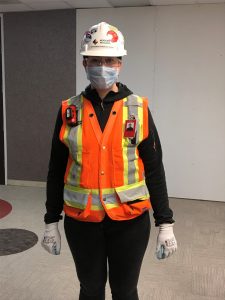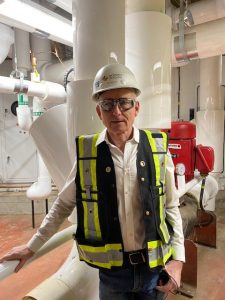As our industry celebrates the annual Health and Safety Week, we want to take this opportunity and highlight the crucial work of our dedicated Health and Safety team. Modern Niagara takes pride in our position as an industry leader in employee Health and Safety, which could not have been achieved without the passion and commitment of our Health and Safety Team members, whose work has only become more important and challenging with the onset of the COVID-19 Pandemic. As such, we reached out to Ekaterina Borshevetskaya (Health and Safety Specialist), Troy MacDonald (Health and Safety Regional Manager) and Ken Brodie (Health and Safety Specialist), to learn about their journeys into the industry, their roles and responsibilities, and what Health and Safety means to them.
How did you get started in Health and Safety and how did you come to Modern?
Ekaterina: I joined Modern Niagara two years ago. I was researching construction companies in Ontario, and Modern Niagara stood out compared to other companies. I applied and got a response within the same day, the first time that ever happened. I have been working in Health and Safety for

Ekaterina Borshevetskaya
around 16 years.
Troy: Before coming to Modern in 2017, I was working in Ottawa for a Health and Safety consulting company and Modern happened to be a client, so I was handling a lot of their training and site inspections. There happened to be a vacancy in the department for a safety specialist and it was an easy decision to join, since I had already been working with them.
Ken: Prior to joining Modern, I was working in a gold mine in Northern British Columbia. Once the project was over with, I was looking for other jobs. Modern Niagara had recently acquired Keith Plumbing and Heating and they didn’t have a full-time safety person. I applied and moved in to start off the safety program.
As Health and Safety Specialists, what do you do on a daily basis and what are some of your responsibilities?
Ekaterina: A lot, depending on the day and what’s going on that day. If it’s business as usual, my day consists of visiting project sites; meeting with the Foreperson and Project Manager to see what needs to be addressed first; reviewing safety documentation that was completed during the week; have a walk about the site, which can be 30 minutes or two to three hours depending on the site; meeting with workers, seeing if there are any problems; work on a toolbox talk or communications; JHAs, Crane Lift Plans; Site Specific Safety Plans; per-qualifications for the new jobs; and safety inspection reports with recommendations. In addition, my day might include fit testing for the workers, training, incident investigations and follow up with workers on modified duties.

Troy MacDonald
Troy: Katerina pretty much nailed a lot of what we do. I’ll break the work we do into a couple parts: there’s the proactive, reactive, and the routine. The fun stuff is the proactive, which can include job hazard analysis, setting up job sites for people,; and helping plan the safety end of a project before it starts. The routine sides of things include regular site inspections,; consulting,; and both audits and paperwork (lots of paperwork). Finally, the reactive part is where things have not gone according to plan and the main task revolves around investigations. That being said, I like to communicate to everyone that investigations are a good thing, because hopefully we all learn something from it and be better in our work.
Ken: Before any of our workers even step foot on site, we collaborate with all our Project Managers, Estimators, etc., to get the jobs going. I also work with six external agencies that are checking on our systems to make sure that our numbers as well as our safety records are good, all before we even get a job. Once we get a job, there is always a start-up meeting that we introduce our safety plans to our clients. We’re always making sure we have everything we need to get the job done safely, like ensuring that all the teams in the field have the necessary PPE and tools. We also do a lot of claims management. Any time a worker’s injured, or on a return-to-work program, or on modified duties, we coordinate all of that. There’s also a good amount of community involvement. Our community consists of our clients and our field teams, and we just try to do as good a job as possible to keep them happy, productive, and safe.
How has COVID-19 impacted your work and how did the Health and Safety Team react to the pandemic?
Ken: When the pandemic came about last March, it was all new so it probably took about 40-50% of our work week just to figure out COVID-19 and what our response would be. As the year has gone on, we’ve obviously become increasingly familiar with the situation. If something happens, such as somebody gets sick or if there is an outbreak, we do contact tracing, we notify anyone involved, and we bring in external cleaners to sites and offices. We didn’t have to react much, as we already had the protocols in place, and it was incredible how our leadership team understood and appreciated the situation right away, and as such we were a leader in the industry in our COVID-19 response.

Ken Brodie
Troy: To echo what Ken said, our work went from 45-50 hours a week to 60-70 hours a week. We were dealing with something that has caused an amazing amount of anxiety, questions, anger, frustration and obviously loss. I’m sure Ken and Ekaterina will agree that what we’re dealing with is not normal and every one of us has stepped up and taken this head on. For a company the size of Modern, they made changes incredibly quickly and were reactive when they had to be, so that made life easier for us because everything was made available to us. We were dealing with the frontline of trying to educate, listen, communicate, assist, and react to the needs of our field team(s). At the end of the day, we’re still hanging in there and it’s the passion and leadership of our team that has kept us going strong and helped us maintain the skills and level of care needed for what we do.
Ekaterina: I agree with Ken and Troy that Modern Niagara stands out in how we are handling COVID-19, providing PPE and disinfection supplies to workers, and enforcing the protocols within our company and with our subcontractors. We always ensure that we are setting an example for our team. This includes always wearing the correct type of face mask, keeping physical distance, and washing hands (A LOT). Working by example is how I conduct safety overall. Also, everyone’s having their difficulties with COVID-19, so I make sure to spend some time talking with the workers and/or the foreperson and finding out what should be done better or to at least hear out the field teams.
Why is Health and Safety so important for you and the work you do, and why is it so important that a company like Modern Niagara takes such a focus on making H+S a key part of our culture?
Ken: My dad suffered an injury from a farming accident when I was young, and it came down to something very simple and potentially avoidable. Since then, I’ve had the mindset that, if you put a little effort into things, you can keep workers safe and keep families together. Working safely seems like such a fundamental aspect of an occupational life. Obviously, we know that the production side has to continue and the job must go on, so our job is to keep our workers safe and keep our business going. We’ve got such a great safety culture in our company and everyone in the field buys into it. We’ve got very few incidents and injuries because people here believe in what we are doing and they appreciate that it keeps them safe.
Troy: I was told today twice from different foreman that they were glad they didn’t have the job I had. In return, I said that I was lucky to have this job and that I loved the work I do. When we do well, as Ken said, families stay together and that is a fantastic reason to get up in the morning and go to work! We got the one job where get up and try to make lives better, and it’s a fantastic feeling at the end of the week. I try and explain to people that the stuff we do are things that nobody will notice most of the time; if it’s a routine day and nobody got hurt, then that’s fantastic. We’re in the department where success comes from things not happening.
Ekaterina: I’m a true believer in Health and Safety and I know that it saves lives. All the policies, the rules, the protocols, were written because somebody got hurt, was permanently disabled, or lost their lives on a job site. Health and Safety is always about prevention and solutions. When I see a worker on the jobsite that may need help, I always stop and find the best way for this worker to do their job safely. That’s what makes me happy and lets me sleep well at night. Modern’s approach to Health and Safety makes us a leader in the industry, allows us to be more competitive in bidding, and ultimately makes us more successful as a company.
Troy: Also, since I came from an environment of consulting, I got to see other companies that did not appreciate or buy into the Health and Safety culture nearly as much as Modern. I have seen a lot of Health and Safety people get burnt out because of the company they work at, and Modern Niagara is not like that. They believe in this stuff and they invest the time, money, education, and training from top to bottom. People think that Health and Safety and Production are like a seesaw, but I don’t think that’s the case with us. The fact that we work hand in hand with productions and operations people is a testament to the leadership of Modern and how everyone buys into Health and Safety.
Modern Niagara is always looking for passionate individuals to join our Health and Safety Team. If you’re interested in joining our team of dedicated Health and Safety professionals, click here to see our current opportunities:

